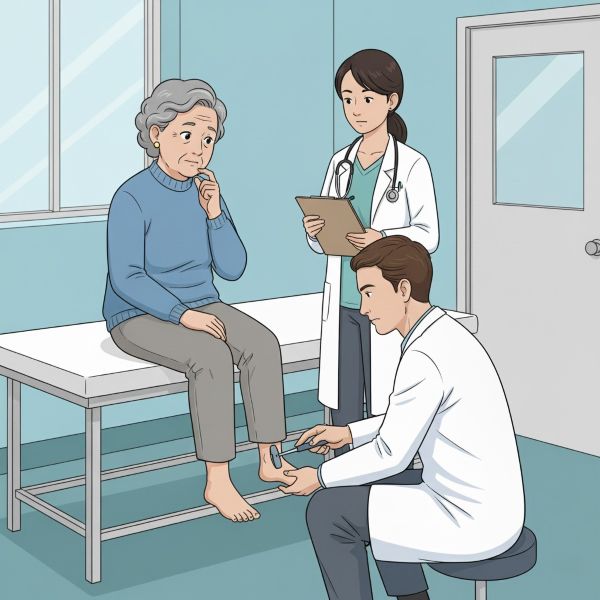Age-Related Signs
Overview of Age-Related Neurological Changes
A number of neurological signs become more prevalent with increasing age. These changes are often related to the ageing process itself rather than to a specific age-related disease. Therefore, they are not necessarily of pathological significance when assessing the neurological status of older individuals, although distinguishing normal ageing from early disease can be challenging. A brief topographical overview of common age-related signs is provided below.

Distinguishing the signs of normal ageing from pathology is a key challenge in geriatric neurology.
Cranial Nerves
- I (Olfactory): Diminished sense of smell.
- II, III, IV, VI (Visual/Oculomotor): Presbyopia (age-related farsightedness), reduced visual acuity, depth perception, contrast sensitivity, and motion perception. "Senile miosis" (smaller pupils) and restricted upward conjugate gaze are also common.
- VIII (Vestibulocochlear): Presbycusis (age-related hearing loss) and impaired vestibulospinal reflexes, affecting balance.
Motor System
- Appearance: Generalized loss of muscle bulk (sarcopenia) and "senile" tremor.
- Tone: Increased rigidity and gegenhalten (paratonia).
- Power: A gradual decline in muscle strength.
- Coordination & Gait: Impaired speed of movement (bradykinesia), general impairments of gait, and features of parkinsonism.
Reflexes
- Phasic Muscle Stretch Reflexes: Tendon reflexes may be depressed or absent, especially the ankle (Achilles tendon) jerk. The jaw jerk may become more prominent.
- Cutaneous (Superficial) Reflexes: Abdominal reflexes may be depressed or absent.
- Primitive/Developmental Reflexes: The glabellar, snout, palmomental, and grasp reflexes (Frontal Release Signs) may reappear with ageing.
Sensory System
- Decreased sensitivity to vibratory perception is very common. There may also be a reduction in pain, temperature, and proprioceptive sensation, particularly in the distal extremities.
Pathophysiological Correlates
Neuroanatomical correlates for some of these signs have been defined. There appears to be an age-related loss of distal sensory axons and of motor neurons in the ventral horn of the spinal cord, which accounts for the observed sensory loss, loss of muscle bulk and strength, and reflex diminution.
References
Franssen EH. Neurologic signs in ageing and dementia. In: Burns A (ed.). Ageing and dementia: A methodological approach. London: Edward Arnold, 1993: 144-174
Larner AJ. Neurological signs of aging. In: Pathy MSJ, Morley JE, Sinclair A (eds.). Principles and practice of geriatric medicine (4th edition). Chichester: Wiley, 2005
Cross References
Frontal Release Signs; Parkinsonism; Reflexes
